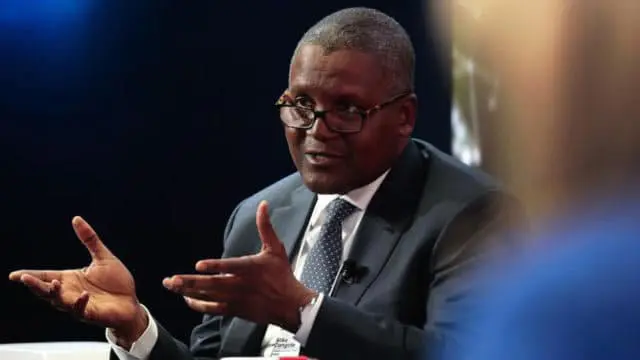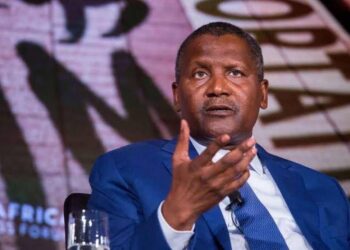The Chairman of Dangote Refinery, Aliko Dangote, said that his company will source crude oil from other African oil-producing nations following recent imports from the United States and Brazil.
Dangote made this disclosure in a statement to newsmen during a tour in his Lagos-based refinery on Saturday.
According to the business mogul, the refinery is expecting feedstock acquired from the US and Brazil in the coming months.
He mentioned that conversations are ongoing to secure more crude from African countries like Angola, Senegal, and Libya, all of which are oil-producing nations.
“We will start importing crude oil from African countries. When we get to those countries, we’ll start negotiating with them. We’ll start bringing in from there.
“We have just bought from US and Brazil. So I think by next month, we’ll expand the scope to most of African countries.
“If we availability in Nigeria, we won’t have to turn to these other countries,” Dangote said.
When asked about the timeline for sourcing crude from these African countries, Dangote stated that it could begin as soon as next month.
“Very soon. I think by next month. You know crude, you have to book two months in advance. So, I’ll say October we’ll be bringing in from these African countries,” Dangote responded.
Feedstock from US, Brazil
According to recent reports, Dangote refinery secured 6 million barrel crude oil from US, which is expected to reach the $19 billion facility by August.
In addition, the mega refinery will also receive about 5 million barrel of crude oil from US by September, data from Bloomberg show.
Accordingly, Dangote is also sourcing crude from the South American country, Brazil, in the coming months to ramp up production as it sets to commence the supply of petrol to the market this month.
The leadership of Dangote has vehemently lamented the unavailability of crude in Nigeria, forcing the oil facility to seek alternatives from other countries.
IOCs unable to supply local refineries
Despite being a leading oil producer, Nigeria still struggles to meet its OPEC quota as well as supply local refineries in the country.
Some local refineries, including Dangote, have accused International Oil Companies (IOCs) of refusal to meet their demands, alleging that these IOCs prefer to sell the crude abroad.
In response, the regulatory body of oil in Nigeria, NUPRC, has insisted that the IOCs meet local demands first, before exporting to other African countries.
PMS Supply expected in July
Moreover, Dangote has said his refinery will supply petrol to local marketers this month.
Dangote mentioned that the change in date was due to a slight delay, prompting the shift from the originally proposed June to mid-July.
The CEO said the refinery will commence production of petrol between 10 and 15 of July, while supply to local marketers will commence from the third week of the same month.
“We had a bit of delay, but PMS will start coming out by 10 to 15 of July. But then we want to keep it in tank to make sure that it settles. So by third week of July, we’ll be able coming out to take it into the market,” Dangote said.
The refinery is expected to significantly reduce Nigeria’s dependence on imported petroleum products.

























It is a shame on this country and government not to provide crude oil for Dangote Refinery. It is not patriotic on the side of the people in government to allow this to happen. Our local refineries ought to get crude first before exporting the excess to other countries. By this action government and NNPC and all regulators concern have proved to us that making money for themselves is more important than Nigeria economy and her citizen s welfare. There should be immediate ban on crude oil exchange or swap for refined products outside Nigeria. If there should be any, it should be given to Dangote Refinery or any of the local Refineries not foreign Refineries.
So this is how we are going to continue to be clolonised indirectly.. Shame on our leaders. They prefer to please their western evil freinds in exchange for their immunity. Rather than putting their country first.